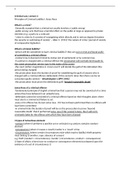Class notes
Criminal Law Actus Reus Lecture Notes
- Course
- Institution
- Book
This document consists of detailed notes from a criminal lecture on actus reus. It explains the principles of criminal liability 1; actus reus as well as the types of actus reus elements, the requirements, exceptions etc. all referenced with case law to use in the final exam.
[Show more]




